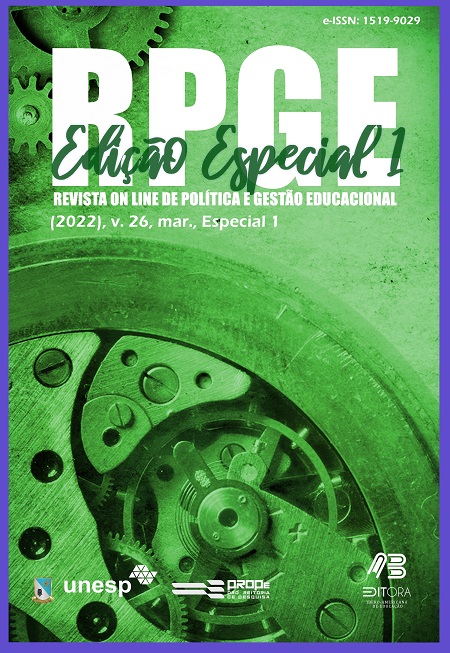O papel educacional das redes sociais na comunicação de políticas no Vietnã
DOI:
https://doi.org/10.22633/rpge.v26iesp.1.16513Palavras-chave:
Rede social, Comunicação política, Democratização, Consenso socialResumo
Profundamente ciente das vantagens das redes sociais, o governo do Vietnã logo usou as redes sociais como um novo meio de comunicação no ciclo político. Como resultado, as redes sociais têm contribuído ativamente para mobilizar a participação das pessoas na gestão social, criando confiança das pessoas no governo e consenso social. As redes sociais têm desempenhado um certo papel na comunicação de políticas. Este estudo mostra claramente que o uso de redes sociais na comunicação de políticas no Vietnã também tem muitas limitações e inadequações que precisam ser superadas rapidamente. Baseado em estudo de documentos estaduais sobre políticas, avaliando a situação atual das políticas de comunicação política nos últimos anos, que enfatiza o papel da educação das redes sociais; este estudo continua a esclarecer o papel educacional das redes sociais na comunicação de políticas e, ao mesmo tempo, recomenda soluções para melhorar a qualidade desta nos próximos tempos.
Downloads
Referências
ACADEMY OF JOURNALISM AND COMMUNICATION. Social networks in the context of information development in Vietnam. In: SCIENTIFIC CONFERENCE UNDER THE STATE-LEVEL TOPIC KX.01.10/16-20, 2018. Proceedings […]. 2018.
CHADWICK, A. The Hybrid Media system: Politic and Power. United States of America: Oxford University Press, 2017.
MERCIER, A. et al. Political communication. Hanoi: Political theory, Hanoi, 2010.
CENTRAL PROPAGANDA DEPARTMENT. Reporters Handbook 2019. Hanoi, 2019. p. 27-30.
COMMUNIST PARTY OF VIETNAM. Document of the 13th National Congress of Deputies, Hanoi: National politics of truth, v. 1, n. 2, 2021.
KIRKPATRICH, D. The Facebook effect and the global revolution of social networking. Hanoi: World, 2011.
DUC, D. A. Discussing users creating content in the social network space. In: PRESS CONFERENCE IN THE FOURTH INDUSTRIAL REVOLUTION, 2019. Proceedings […]. 2019. p. 155.
DUNG, P. X. The fourth industrial revolution: the revolution of convergence and thrift. Hanoi: Science and Technology, Hanoi, 2018.
DUNG, N. V. Some issues of public policy communication in Vietnam today. Journal of Political Theory, v. 2, 2018.
JOWETT, G.; O'DONNELL, V. Propaganda and Persuasion. 5. ed. SAGE. Publications Inc, 2012.
GAM. Social Network. Hanoi: Labour, 2019.
PARKER, G. G.; ALSTYNE, M. W. V.; CHOUDARY, S. P. Platform revolution: Breakthroughs in technology application and ways to build new business models. Hanoi: Industry and Trade, 2017.
HA, Q. Stay awake when participating in social networks. Available: https://nhandan.com.vn/chinhtri/binh-luan-phe-phan/item/40378602-tinh-tao-khi-join-join-mang-xa-hoi.html. Access: 31 May 2019.
HANG, D. T. T. Traditional media or new traditions: content is always king. Journal of Political Theory and Communication, v. 3, p. 53-67, 2020.
HEIMANS, J.; TIMMS, H. New power. Publishing House General Ho Chi Minh City, 2019.
SUU, N. Q.; THANG, N. M. Social network management needs to approach development trends. Journal of Democracy and Law, v. 9, p. 310-318, 2018.
TAN, D. D. Press and Social Network. Ho Chi Minh City: Young Publishing House, 2017.
DIJCK, J. V. The culture of connectivity: a critical history of social media. United States of America: Oxford University Press, 2016
INEJI, P. U.; BASSEY-DUKE, V.; BROWN, N. J. Application of Political Propaganda by Government in the Resolution of ASUU/FGN Industrial Conflict of 2013. Advances in Journalism and Communication, v. 2, p. 103-112, 2014.
WASSERMAN; S.; FAUST, K. Social Network Analysis: Methods and Applications. Cambridge University Press, 1994.
FRIEDMAN, T. L. Thanks for being late. Ho Chi Minh City: Young Publishing House, 2018.
VIETNAM GENERAL CONFEDERATION OF LABOR. Using social networks in propaganda and advocacy work of the Vietnam Trade Union. 2019. Available: http://congdoan.vn/tin-tuc/tuyen-truyen-giao-duc-3576/su-dung-mang-xa-hoi-trong-cong-tac-tuyen-truyen-van-dong-cua-to-chuc-cong-doan-viet-nam-472704.tld. Access: 10 Jan. 2021.
VNETWORK. Vietnam Internet Statistics 2020. Available: https://vnetwork.vn/news/thong-ke-internet-viet-nam-2020. Access: 10 Jan. 2021.
UNIVERSITY OF SOCIAL SCIENCES AND HUMANITIES, VIETNAM NATIONAL UNIVERSITY, HANOI. Survey results of the Internet and Society Research Program (VPIS). 2017.
UNITED NATIONS. Declaration of Principles Building an Information Society: Global Challenges in the New Millennium. Section a, Article 49 (WSIS-03/GENEVA/DOC), Society Summit information. Geneva, 12 Dec. 2003.
Downloads
Publicado
Como Citar
Edição
Seção
Licença
Copyright (c) 2022 Revista on line de Política e Gestão Educacional

Este trabalho está licenciado sob uma licença Creative Commons Attribution-NonCommercial-ShareAlike 4.0 International License.
Manuscritos aceitos e publicados são de propriedade da Revista on line de Política e Gestão Educacional. É vedada a submissão integral ou parcial do manuscrito a qualquer outro periódico. A responsabilidade do conteúdo dos artigos é exclusiva dos autores. É vedada a tradução para outro idioma sem a autorização escrita do Editor ouvida a Comissão Editorial Científica.











